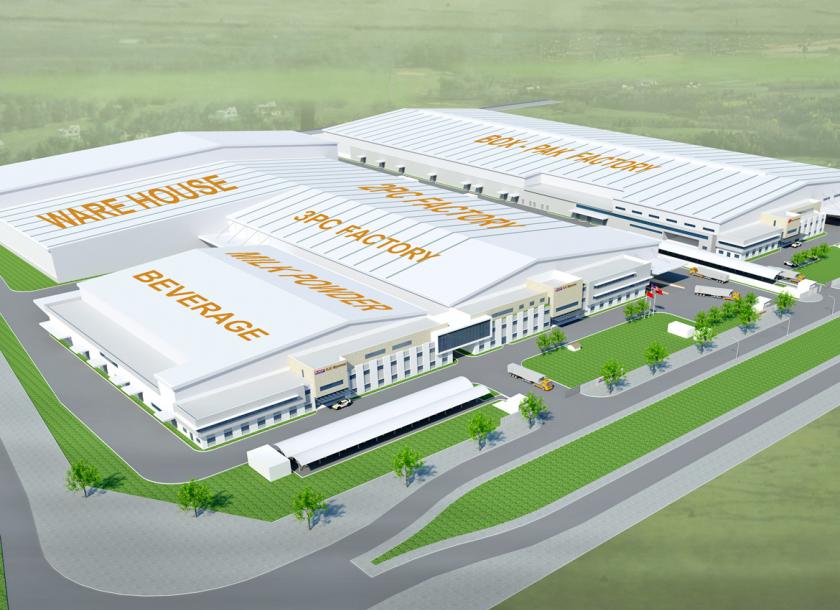Myanmar: ASEAN’s largest packaging firm to start Thilawa operations next year
Malaysia-based Kian Joo is one of the biggest can manufacturers within ASEAN, manufacturing a wide range of products and providing packaging services. The group has manufacturing facilities in Malaysia and Vietnam, with its international procurement and marketing centre in Singapore.
Kian Joo first expanded into Thilawa in early 2015. The company set up Kianjoo Can Myanmar (KJMM) and Boxpak Myanmar (BPMM) with an initial capital of US$16 million and $7.5 million respectively for the Thilawa project. The total investment cost is expected to amount to $75 million for KJMM and $38 million for BPMM.
At a time of rising demand and promising growth prospects in Myanmar, KJMM will manufacture tin cans, aluminium cans, carry out original equipment manufacturing and packing of beverages and milk powder, while BPMM will produce carton boxes.
Thilawa advantage
Ooi Teck Huat, CFO of Kian Joo Can Factory (KJCF), cited ownership flexibility, locality, labour market and land lease as reasons for opting to set up its base in Thilawa.
“We are also attracted by the fact that we are able to have 100 percent ownership of companies we set up and we are able to have lease industrial land for 50 years with an option to renew for another 25 years,” Ooi told The Myanmar Times during an interview at KJM Aluminium, one of the group’s manufacturing plants in the town of Nilai, which is located in the state of Negeri Sembilan, Malaysia.
Mr Ooi added that the tax incentives and labour market in Thilawa are attractive. Geographically, the SEZ is close to the port, which is important for the business because most of the raw materials have to be imported. Thilawa is managed by a one-stop service centre which is located in the SEZ, and which is “extremely helpful” in cutting the red tape for investors.
Importantly, language is not a barrier in Thilawa because “most of the Myanmar citizens can speak English, with some able to communicate in Chinese,” said Mr Ooi.
Existing challenges
While he was confident with the “ability and professionalism of the Thilawa SEZ Management Committee”, Mr Ooi stressed that the SEZ is “still developing the infrastructure necessary for the success for company like ours.”
The biggest difficulty is the inconsistency of power supply in the SEZ. “There [are still] frequent electricity outages and power tripping, fluctuations in voltage, even in Yangon itself. This outage includes both accidental outage and planned shutdown for sub-station maintenance. The outage may be a few minutes to 8-10 hours, based on the data obtained,” Mr Ooi said.
The manufacturer is hopeful that the outage will be minimised soon, with a new 50MW natural gas-fired power plant in Thilawa almost up and running and another one, with 106MW, in Thaketa expected to commission in the first quarter of next year.
Other challenges include poor road network and telecommunications infrastructure. “The road transportation system and infrastructure needs to be improved to enhance connectivity within Myanmar and to ensure manufacturers like us are able to deliver our goods to our customers or to the port without much hassle.
“Telecommunication system is also vital to ensure connectivity with outside world,” he stated. Most of the roads are not in good condition and have potholes, road leading to various industrial zones in Yangon Region are also poorly maintained. This “bumpy road condition” will cause damages to fragile goods during transportation, according to the packaging giant.
Another issue is the capacity of the ports. In Myanmar, “95pc of cargoes are handled by Yangon and Thilawa ports which are located along the river, where navigation is restricted to high tide and daylight hours. Goods have to be transferred to smaller vessels as larger vessels could not berth at these ports, leading to higher shipping costs.”
KJCF is the second Malaysia-based investor to join Thilawa after YTL Corporation, which is building a cement plant in the SEZ.
Source: https://www.mmtimes.com/news/aseans-largest-packaging-firm-start-thilawa-operations-next-year.html


 Thailand
Thailand




